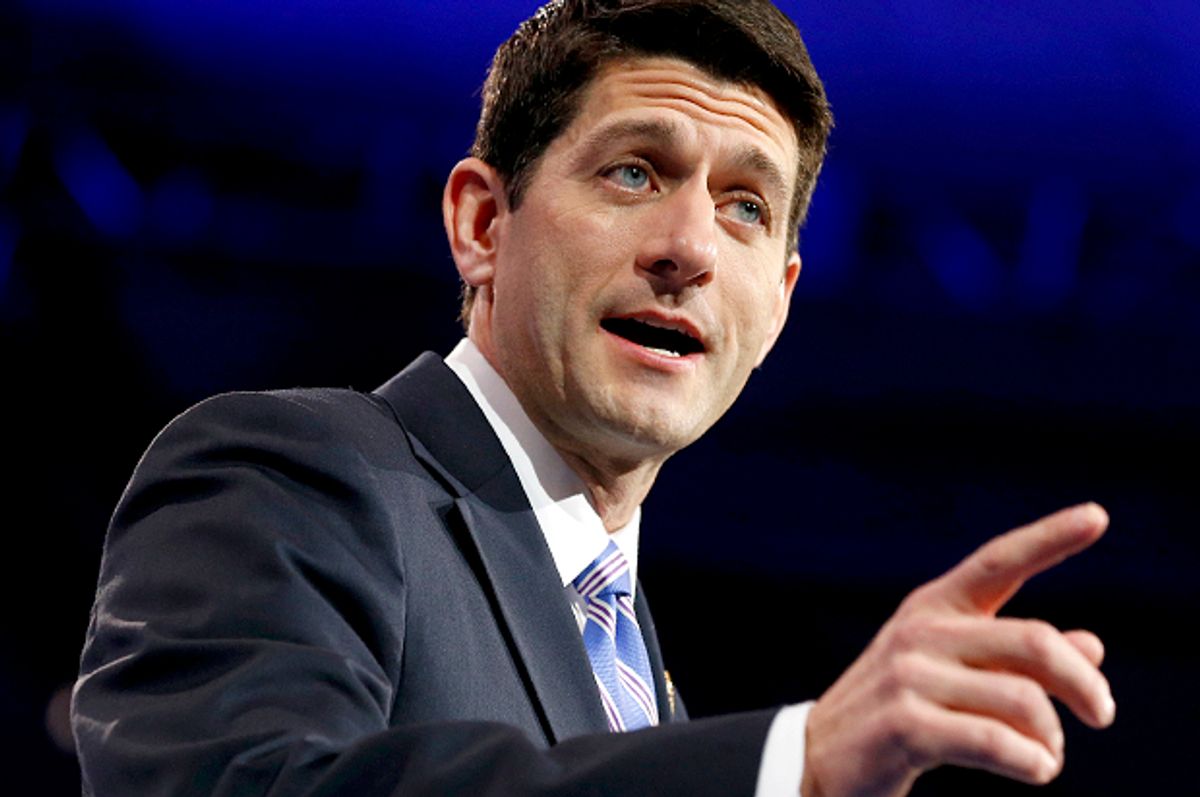In the summer of 2011, during one of the pivotal moments of Barack Obama’s first term as president, the best friend liberals had in Washington was none other than arch-conservative, Ayn Rand-loving Republican congressman Paul Ryan.
Yes, the socially conservative supply-side radical embodies much of what modern American liberalism claims to stand against. But as multiple reports over the years have confirmed, if it weren’t for Ryan’s unwillingness to help Obama get a “win,” the president would likely have made one of liberals’ worst nightmares come true by signing on to a decidedly conservative version of the so-called grand bargain. Six years in, it looks exceedingly unlikely that Obama will ever agree to a deal that cuts Social Security; and if that makes you happy, you have Ryan (and Eric Cantor) to thank.
The reason I find myself on this stretch of memory lane isn’t because I’m particularly interested in reliving what I still consider the nadir of the Obama presidency. Instead, it’s because the slow-but-sure march of the Trans-Pacific Partnership (TPP) through Congress, which liberals overwhelmingly oppose and Obama backs — making it a kind of diplomatic version of the grand bargain — has me thinking that liberals could once again stand to look at Ryan as a frenemy, if not quite friend. But according to a Wednesday report in Politico, this time, Ryan’s calculation is quite different.
While granting the president “fast-track” trade authority for the TPP looks like it will almost certainly clear the Senate, the House is a much heavier lift. Many rank-and-file Republicans — and especially the more Tea Party-oriented members — are wary to do anything Obama wants. They also worry that granting fast-track authority, which essentially allows the president to keep Congress at arm’s length during negotiations, will make the party’s rhetoric about an out-of-control executive sound disingenuous. Politico reports that Ryan has thrown himself fully into assuaging these fears, working “almost single-handedly and quite stealthily” to bring skeptical Republicans into TPP’s corporate embrace.
“I just think it would be a big mistake for our country if we were to fail to do this,” Ryan told Politico while “speaking broadly about trade promotion” (please). “I think this would be a punctuation mark on the declining narrative of America and we should not have our fingerprints, as Republicans, on anything that makes it look like we’re in decline,” he continued. “Trade is very important, it’s about time that this administration gets around to it. Forget our party, this is important for our country.” The pitch, translated: Never mind about Obama. USA! USA! USA!
Politico reports that Ryan’s not only using nationalism to inspire Republican support for a deal that will overwhelmingly benefit multinational corporations, though. According to Politico, he is “also trying to keep outside conservative groups like Club for Growth and The Heritage Foundation neutral” and reaching out to the business community for support. Politico quotes a spokesman for the Trade Benefits America Coalition calling Ryan’s attempts to win over House GOPers “unrelenting.” Ryan, according to the spokesman, “is an authentic expert on [trade]” and makes wary conservatives “feel much more assured.” (One imagines Ryan’s ability to leverage his powerful fundraising network also helps.)
When it comes to explaining why, exactly, Ryan has decided to be Obama’s man in the House, Politico provides considerably less light. As has been the case with the D.C. press’s attempts to analyze Obama’s motivations from afar, Ryan’s goals are reduced to meaningless phrases like “legacy-burnishing”; the kind of stuff reporters write when “I don’t know” isn’t acceptable and when “because large corporations want it” is too unvarnished and gauche. It’s not especially difficult, however, to guess what might be driving Ryan — and it’s not a desire to guarantee the speaker at his eulogy notes his fondness for protecting Hollywood’s intellectual property.
The more plausible explanation for why Ryan finds himself on Obama’s side this time, in contrast to his stance in 2011, is that the hyper-wealthy corporate forces that run D.C. care much more about passage of the TPP than they did about one measly presidential election. Sure, most of them — though hardly all — would rather have had Mitt Romney be president; but as Obama is showing here on the TPP, and has shown many times before, he is more than willing to play ball with the global 1 percent. If lost to Romney, corporate profits would increase and the TPP would be on the docket. Since he won, corporate profits have increased and the TPP is on the docket.
For a guy like Ryan, a former vice-presidential nominee who is quite likely still nursing White House ambitions, that makes support of the TPP a no-brainer, regardless of whether his support will help the president. In the political economy of the contemporary United States, partisanship is everything — until it isn’t. In those cases, it’s usually because the members of the 1 percent who make up the donor class have decided it’s time for politicians to do away with childish things and get down to brass tacks. It’s possible to ignore their warnings and keep your place in Congress, of course; but a politician who does that faces minuscule odds of ever becoming president.
And that’s how liberals end up looking across the aisle and seeing Obama and Ryan working toward the same outcome. Politicians: the ultimate fair-weather friends.

Shares